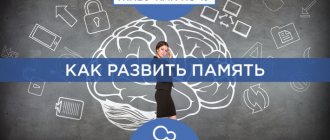Have you started to notice that you can’t remember where you put your keys or once again forgot about an important meeting, you can’t concentrate on important things and are distracted all the time, you don’t remember new material well or you can’t remember recently covered material? If this is the case, then it’s worth thinking about how to improve memory and attention in adults and return to its former state.
The first thing that comes to mind is to start a diary or an online calendar with reminders so as not to miss important events and meetings. But what to do with information that must be remembered and transferred to long-term memory?!
Unfortunately, it's not that simple. Despite the variety of choices, tablet forms, supplements and medications, there is currently not much scientific evidence that they actually improve brain activity and thought processes. And checking out a $50 drug that promises to strengthen neural connections in the brain in just a couple of weeks doesn’t sound very tempting, especially if it was prescribed by a doctor as part of a promotion.
In the 21st century of information technology, in order to cover the entire volume or even prepare for an exam, you need to do more than just spend time on it. The core of the problem is often precisely poor memorization, weakening of memory and an incorrect approach to the learning process.
Fortunately, there are effective, scientifically proven methods for improving memory and ways to improve brain function, both short and long term, at home, and even make exam preparation easier. Below we will consider each of them separately.
Try meditation to improve your concentration
Attention is one of the main components of memory. In order for data to move from short-term memory to long-term memory, you need to focus your attention on this particular piece of material. Try to do important things away from distractions such as television, music, phones, chats and other entertainment.
This is not always easy to do, especially if you are surrounded by noisy neighbors or children. Try to set aside a time for yourself when no one will disturb you so that you can concentrate on your work.
Memory and concentration are located in approximately the same part of the brain. It has been proven that by increasing concentration through meditation, it leads to an improvement in the performance of the brain and the process of remembering in an adult.
Meditation helps improve and develop working memory, which temporarily stores data needed throughout the day. Simply put, at any given time there are 7 pieces of information in the brain; when a new part arrives, it displaces the old one, which is or is not entered into long-term memory. Meditation helps to pull out that piece of information that is needed at a given period of time, faster.
How long it will take to see positive results is not known for certain. In general this can take from 2 to 8 weeks.
Perhaps the calming effect of meditation increases the ability to cut through mental noise (distractions) and focus on what you need to know at any given moment.
Here are some more effective ways:
- Turn off all notifications when studying.
- Try to isolate yourself from people you know while studying. Go to the library or a cafe where you won't be disturbed.
- Work on only one topic at a time, avoid multitasking and frequently switching to other material.
Why does memory deteriorate?
Memory decline with age is a natural process that is difficult to prevent. And I must say, our brain begins to age much earlier than many assume. Therefore, in order to slow down the process of memory deterioration, you need to understand what happens to the brain at different ages and how to respond to these processes.
Children and teenagers
Content:
- Why does memory deteriorate?
- What to do to strengthen your memory
- Diet for maintaining memory
Childhood and adolescence are a period of intense brain and memory development. For example, due to something called “infantile amnesia,” most of us cannot remember anything from our earliest childhood. Today, experts have several versions of why this happens. According to one theory, as the brain develops, information in it is “overwritten.” In infancy, the organ develops very intensively, new neurons appear much faster than in adults. And with the appearance of new neurons, new connections are formed between them, which is why previously “recorded” information is lost. This explains why few adults can remember anything that happened to them before the age of 2-3 years, and memories of events that happened between the ages of 2 and 7 years are usually very blurred. On the other hand, the memory of young children is still poorly developed, so it is difficult for them to remember what happened to them in infancy.
During adolescence, the prefrontal cortex actively develops, which is responsible for the so-called working memory, decision making and planning ability. Thanks to this, the teenager's brain is better able to absorb information, that is, as the child grows up, his ability to remember improves.
20-25 years
According to experts, it is during this period of a person’s life that his brain works at maximum speed and productivity. By the way, the brain also weighs the maximum at this age – within 1.4 kg. At the age of 20-25 years, people find it easiest to remember new information, including in the form of telephone numbers and names; they can easily count in their heads. And all thanks to good interaction between different parts of the brain.
Nevertheless, scientists have calculated that even at this productive age, approximately every seventh person remembers information poorly. In most cases, the reason for this is to perform multiple tasks at the same time. Experts from the University of California found that if young people are distracted by a computer or smartphone while performing a certain task, their hippocampus (the part of the brain responsible for forming new memories) works worse. That is, the brain does not remember information to the extent that it would remember without distractions to other objects. But ordinary absent-mindedness, when a person, for example, forgot to turn off the iron, happens at any age, including 20-year-olds. In young people, this can happen up to 6 times a week, but, as a rule, this is not a sign of serious memory impairment.
30 years
Despite the fact that the brain of 30-year-olds works very actively, their memory abilities are already beginning to deteriorate. At this age, people may notice forgetfulness for the first time. Starting from this time, with each subsequent decade, the volume of the brain decreases by about 2%, the connection between neurons weakens, and the cortical cells responsible for memory and the ability to learn begin to die. At this age, it is already more difficult for people to learn and remember new things than 10 years ago.
In women in this age group, memory loss is often associated with childbirth. Many mothers experience a phenomenon that experts call pregnancy encephalopathy. In other words, this is a woman’s partial “stupidity” associated with memory impairment. This condition is explained by changes in hormonal levels caused by pregnancy and lactation, which is most likely the cause of these changes. For example, the hormone oxytocin, which is responsible for the emotional bond between a mother and her baby, can also impair the cognitive abilities of the brain. Experts from the University of Bradford found that such memory impairment in women persists during pregnancy, as well as in the first 3 months after childbirth. Then, when hormonal levels are restored, the quality of memory also returns to normal. Experts believe that such temporary “stupidity” of a young mother should not frighten her - in this way, nature took care to focus all the woman’s attention on the child.
In order to maintain cognitive abilities at the same level, it is very important for 30-year-olds to continue to study and read regularly, to acquire new knowledge and skills.
It is also useful to play logic and educational games at this age. A proper diet can also help slow down brain aging.
40 years
This is the age of the first “lapses” in memory. After 40 years, a person standing at an ATM may suddenly realize that he has forgotten his card PIN code, or does not remember what he wanted to say or do a moment ago. But, according to experts, if such a condition does not occur often, then it should not be scary. The fact is that after 40 years, the connection between the neurons of the brain that regulate the exchange of information weakens somewhat, and some are completely destroyed. The hippocampus continues to shrink in size, a process that will continue until approximately 65 years of age.
But there is also good news. During this period, a person develops flexibility of thinking, which is commonly called life wisdom. In addition, the brain adapts to changes, causing middle-aged people to use both hemispheres more effectively.
By the way, experts from the British Royal College of Physicians found that in many cases, memory lapses in 40-year-olds are not degenerative disorders in the brain, but the result of absent-mindedness. By and large, this happens due to the desire to remember as much as possible from the information flows around you (news, books, information received at work, from friends and relatives), and as a result, the most basic things fly out of memory.
The easiest way to deal with memory lapses at the age of 40 is to write down information that is important to you. Moreover, it is better to do this “by hand”, and not by typing on a smartphone or computer. Norwegian researchers have discovered a connection between memory and fine motor skills. And also, according to scientists, if you speak the information you are recording out loud, the chances of not forgetting it increase several times.
Another good way to avoid the embarrassment of memory lapses in your 40s is to develop a habit and stick to it. For example, if a person constantly forgets where his keys have gone, he should always put them in the same place. Then you won’t have to remember new information.
50 years
After 50 years, the blood supply to brain cells deteriorates and the prefrontal cortex, which is responsible for storing information needed for a short time, shrinks.
During this period, short-term memory weakens even more, but at the same time a person can easily recall information learned in his youth. Therefore, people over 50 often answer questions from the school curriculum without any problems, can quickly solve crosswords, and many successfully take part in intellectual quizzes. By the way, the peak of such intellectual activity in representatives of different sexes occurs at different times. So, for men it is 50-55 years old, for women almost 60.
60 years
During this period, connections between different parts of the brain noticeably weaken. Hence the frequent forgetfulness. It can be difficult for a person to remember the names of acquaintances and words from his vocabulary. And this can be repeated several times a day. And by the way, if this happens to people after 60 years of age, then you should not immediately attribute Alzheimer’s disease to them. This disease is diagnosed in only one in a thousand people over 65 years of age. In most cases, memory loss at this age is the result of a natural weakening of neural connections.
For people of this age, it is very important that they are not interrupted during a conversation, this makes it easier for them to collect their thoughts and not forget what they wanted to say. A person over 60 needs more time than a younger person to concentrate.
70 years old
London experts have discovered that if a 25-year-old and an elderly person over 70 are given a list of 10 unrelated words, the young person will most likely be able to repeat all of them, while the elderly person will be able to repeat no more than 5.
At the age of 70, visual memory is greatly weakened, so older drivers use a navigator more often, even if they are driving on a familiar road. Also, at this age, it is easier for people to remember events that happened 25 years ago than what happened yesterday. Experts explain this phenomenon by emotional memory: a person remembers longer those events that caused him vivid experiences. Such memories become very firmly embedded in long-term memory. Research shows that older people attribute the majority of such memories to those aged 20-30 years.
80 years old
Despite the fact that memory suffers more and more during this period, this does not mean that an 80-year-old is doomed to develop dementia or Alzheimer's disease. According to experts, senile dementia is diagnosed only in every sixth person over 80 years of age. In other cases, memory loss is the result of characteristic age-related changes in the brain.
Structure and organize your data
Researchers have discovered that information is organized in the brain into interconnected “clusters.” This ability of the brain to structure data can be used in everyday life. Try to group similar ideas and terms together or make an outline in the form of notes or group material from different books, this will make it easier to remember and highlight the information you need from different sources.
Ways and methods of memory development
To begin with, it is worth noting that we often train our memory and attention using various everyday situations in everyday life. We remember what we want to buy in a store, try to remember the birthdays of relatives, friends and acquaintances, retell the contents of a recently read book or textbook - all this and much more is good memory training. However, the use of special exercises gives us the opportunity to concentrate on the specific goal of developing a certain ability of our memory.
When talking about memory training, it is important to understand that it is almost impossible to directly train a specific ability to memorize material. Memory always develops in close connection with our attention, perception, thinking, sense organs and other phenomena of human nature. Therefore, most of the exercises below produce a complex effect on our thinking, as well as on our memory as an important component of thinking. For convenience, the exercises are divided into 2 groups: visual and auditory, and together they form an important part of our memory improvement training.
Use mnemonics and abbreviations
Mnemonics are a memory technique often used by students to help them retrieve data from their brains faster. In other words, it's a simple way to remember complex information. For example, you can associate a term that you need to remember by associating it with a subject that is familiar to you. The best mnemonics are those that are associated with positive images or humor. You can come up with a rhyme, song, or joke to help you remember a specific segment of the material.
Acronyms are the most commonly used technique for associative memorization of short lists or sequences.
For example, it will be easier to understand a list of countries included in a group if they are combined into one word consisting of the first letters. For example, BRICS (from English BRICS) is a group that includes five rapidly developing countries (Brazil, Russia, India, China, South Africa), UFO, university
And so on.
In everyday life, we are already so accustomed to acronyms that we don’t even notice them and don’t think about what words they consist of.
As you learn new knowledge, you can create your own acronyms.
Remember the names of the animals
You have 30 seconds to remember these animals and their names. After this time, close the picture and try to demonstrate the magic of your memory by naming the animal and its nickname.
Exercise from the book “Memory never fails”, author Angels Navarro
If you find it difficult to complete a task, then your memory is screaming SOS. If the exercise was easy for you, continue to train your skills and you will always be in shape, says Angel Navarro, author of the book “Memory Does Not Fail.” Finding ways to improve your memory is not difficult if you understand how it works. While performing the exercise, the following processes occurred in your head:
- memorization;
- storage;
- reproduction and recognition;
- forgetting.
Don’t worry, forgetting is a natural process that happens with irrelevant information. The brain gradually ceases to recognize those facts and knowledge that have not been used for a long time. Therefore, if you want to remember any important things - from school, work or from family life, refresh this knowledge , update the information.
But is it possible to memorize and store knowledge in such a way as to remember it for a long time? Scientists have found that memory is divided into short-term and long-term. We were told a phone number, we repeated it to ourselves, while looking for the phone book - we remember it. But now the number is written down - and you can safely forget it. 20 seconds and a limited number of characters - that's all. Therefore, do not scold yourself if you cannot remember a new word or name you heard half an hour ago. Short-term memory is designed in such a way that this is a huge period of time for it. But you can improve these skills and improve your memory, Angels Navarro is convinced.
Analyze the material in detail and repeat what you have learned
To remember information, you must first make it understandable to the brain, and then repeat everything you learned again, then the information will definitely fall into long-term memory. For example, read the definition of a key term, study the definition of that term, and then read a more detailed description of what that term means. By repeating this process several times, you will probably notice that you recall the term more easily and quickly over time.
To repeat the studied material, it is also recommended to divide it into three difficulty categories. For each, select the amount of time you will spend and the days per week.
Review the material again, if you remember it well, then repeat it only once a week.
If you have difficulty reproducing information, then re-read it after a few hours or every other day.
And if you don't remember anything, then study the material again for 10 minutes. After everything, the cycle repeats, you again sort the information according to how you remembered it and allocate your time to repetition and filling in gaps.
Cheese, milk, sausage...
Try to do without the usual paper grocery list on your next trip to the store. The authors of the book “Super Memory for Everyone,” Ekaterina and Vladimir Vasiliev, advise: you need to memorize not the long line “cheese, milk, sausage, cabbage, onions, mushrooms, flour, bread, cookies,” but divide it into three groups of three products.
“ Divide information into groups of 3-4 elements . You can remember much more if you group them into chains. Associated with this is the custom of dividing, for example, telephone numbers into 2-3 digits. It has long been known that three is the optimal number.”
Repeat. Say it to yourself or out loud . Repeat the name of a new acquaintance when he introduces himself, say the sequence of actions to yourself before starting a new activity. Speak your way when you go out on business: “to the post office – to the pharmacy – to the newsstand – to the electronics store.” This way you won't forget anything.
Use different types of memory and mnemonics. Everyone who remembers the colors of the rainbow using the phrase about a hunter and a pheasant knows about mnemonics. Many long, complex lists can be remembered much easier by applying mnemonics to them - just connect the facts with some funny nonsense , this will be firmly fixed in memory, the authors of the book about super memory are convinced.
Visualize information
Visualizing information often helps people remember material better because some people are more visually inclined. Pay attention to photographs, graphs and tables in the same textbooks, for example. You can create your own diagrams, diagrams and drawings, use notes in the margins or colored markers in order to remember significant points and find what you need quickly.
Auditory memory in children
Auditory memory is a type of figurative memory, which consists of processes such as imprinting, storing and reproducing auditory images. The ability to learn through oral explanations and instructions is considered a fundamental skill that will be useful throughout life.
Good auditory memory is necessary for mastering the rules of orthoepy, intonation skills and expressive reading. Poor hearing skills can lead to difficulties in mastering reading skills, learning languages and spelling rules.
Read aloud
Research shows that reading material out loud makes it easier to remember information. Teachers also support this concept and put it into practice when asking their students to teach new material to their classmates. You can also use this approach and learn new material with your friend.
Short term, but so necessary
Schoolchildren and people who have long matured have short-term memory. Its purpose is the primary processing of information for its understanding. It takes just a few seconds to accept what you hear, quickly analyze it, extract what you need, and send this “harvest” of sounds to long-term semantic storage.
This type of auditory memory is especially in demand by children. After all, they study the world, meet new concepts every day, expand their horizons and vocabulary, learn logic and memorization.
What prevents recognition and memorization from hearing?
- Absent-mindedness;
- Lack of interest in the subject;
- Illness, physiological memory problems;
- Weak or unclear audio signals.
Try to weed out these interferences and practice with your child the simplest techniques for strengthening different subtypes of auditory memory.
So, let's take a closer look at this question: how to develop auditory memory? And we’ll talk separately about how to do this for children and adults.
Spend more time on complex information
Which information is remembered most easily at the beginning or at the end? Researchers have found that the order in which data is examined plays a significant role in how quickly the brain samples and produces that information. And the material is remembered best at the beginning of the book and at the end.
Information is often lost in the middle, but this problem can be solved by repeating it several times. Another strategy is to try to rephrase what you've learned in your own words to make it easier to remember.
Why train your brain
According to research results, the peak of cognitive development occurs at approximately 27 years of age. After this, if you do not do exercises to train your memory and attention, it will begin to worsen over time. The less you do with your brain, the more noticeable the deterioration will be.
It is necessary to develop memory together with attention, since success in memorizing a large amount of information is based on it.
There are 4 types of memory (as a rule, one type is better developed):
- Visual - information is better remembered through what is seen;
- auditory - remembering what is heard;
- motor - remembering what is written in one’s own hand;
- complex - combines several types.
Types of attention:
- Involuntary - does not require volitional efforts, occurs regardless of consciousness (for example, loud sounds, flashes of light.
- Voluntary - in this case, a person subconsciously concentrates on something, making an effort (doing some work).
- Post-voluntary - is subconscious in nature, but does not require effort, since it is controlled by a person’s interest (reading when the plot has already captured).
Any activity that uses brain connections that are not needed in everyday life is useful for training. It is important to do something new, unusual, and not develop into a routine - then the brain will develop.
It's also important to remember that forgetting is generally normal. The brain stops “storing” information that you haven’t used for a long time. Therefore, we tend to forget a lot of school knowledge. But, if you don’t want it to be like this, just refresh these memories periodically, and they won’t go away.
Do not miss
- Do not miss
I don’t remember, that means it didn’t happen: how the brain deceives us and erases our memory
Exercise
Physical exercise is known to improve cognitive abilities, concentration, blood circulation in the brain by increasing the flow of oxygen to brain cells, and mood.
Exercise also causes the release of the protein cathepsin B in the brain. This stimulates the growth of neurons (brain cells) and creates additional connections in the hippocampus, an area of the brain responsible for long-term memory and retention.
The effectiveness of exercise in improving brain function has been proven in a number of studies, so let's talk about that first. One study showed that just a few minutes of light exercise resulted in immediate memory improvements. Participants in the experiment performed exercises of varying intensity, and at this moment the scientists observed changes in brain activity.
The results showed that during these exercises, connectivity improved between the areas of the brain responsible for creating new episodic memories (autobiographical memory, which remembers “who, what, where and when”), as well as in the dentate gyrus and hippocampus.
Therefore, with just a few minutes or even an hour of exercise, you can improve your memory. You can try a treadmill or walking to start with, and most people can do it.
Games for memory and attention
Educational games and exercises are a great option not only to pass the time or have fun, but also to improve memory. Let's look at some of the most powerful exercises.
Educational game “memory matrix”
Remember the location of the shaded fields in 1-2 seconds, and then reproduce the shaded fields from memory. The game trains visual memory and memorization speed.
Play now
Anagrams will help develop such qualities as: attention, concentration, speed of thought, speed reading. In this game you have to choose 1 option out of 4, in which only those letters that are part of the given word are mixed. Each round a new word is given. Remember that time is limited! The faster you look for the answer, the more points you will get at the end of the game.
Educational game “Letter span”
A game to develop memory capacity. The screen shows letters that you need to have time to remember and reproduce in the right order.
Play now
The Schulte table is one of the most effective exercises for developing the brain, attention, concentration, and accelerating visual search. This exercise is also the most popular exercise for developing speed reading. Schulte tables usually consist of randomly placed numbers or letters. The number of cells in tables also varies and most often they are 5x5 elements in size.
Educational game “Memorize and call”
This educational game is aimed primarily at developing attention span. The more different elements we can remember at one time, the better.
A table with numbers will be shown for a few seconds; you need to have time to remember all the numbers and reproduce them in ascending order.
Play now
Search for numbers and letters
Try also to practice searching for letters. These exercises are great for developing peripheral vision and speed reading. You can read more about this exercise in the separate article Search for letters and in the article with the simulator Search for numbers and numbers.
Educational game “Remember and find”
A game to develop working memory and memorize objects. For a moment, a set of objects is shown that you need to have time to remember, and from memory determine which object has changed.
Play now
Reading by sighting
We have also developed another useful simulator that is suitable for both the development of lateral vision and the development of speed reading. When you click on the “Random phrase” button, the simulator displays a random sentence for 1-2 seconds. Try to look at the entire line:
Educational game “Find a coin”
- Develops memory capacity
- Improves visual memory
- Improves spatial memory
Open the cells on the screen and find coins. The cell closes after opening, so you need to remember which cells have already been clicked on.
Play now
Tag
Tag is a great way to exercise your brain throughout the day! This is a game for developing thinking . The game of tag is a square board divided into 16 equal square sections. You have 15 square dominoes at your disposal, numbered accordingly. The dominoes themselves are randomly mixed inside the box.
The essence of this game is to put the dominoes in order, namely to place the numbers one after another from top to bottom, from left to right, therefore, the empty square should be from the bottom to the right. The game will help you develop logical thinking and memory, because it is useful to remember various tricks and combinations. You will also be able to develop the ability to calculate moves ahead without making mistakes. Shall we play?
Drink coffee and tea
Caffeine is a fairly well-known brain booster. In large quantities it is unhealthy and even dangerous, but there is no doubt that it improves memory.
In one Johns Hopkins study, one group of volunteers was asked not to consume caffeinated products at all, and a second group was given 200 mg of caffeine supplements 5 minutes after they were asked to look at pictures. The next day they were shown even more pictures, some of them were identical to the previous ones or similar in some way, and there were also new ones.
The group that had taken caffeine the day before did a much better job of identifying which pictures were similar to the original ones and were even able to tell the differences between them.
Tea and coffee contain the highest amount of caffeine, in addition to this they also have a lot of other benefits, the presence of antioxidants, for example. Try to get your caffeine fix from natural teas and coffees, rather than from sugary carbonated energy drinks. In addition to caffeine, green and black tea contain components that improve memory. It is recommended to drink them all day, but preferably not before bed.
Exercises to improve memory
The exercises are done out loud with eyes closed. If you have an assistant, let him record the completion time on paper. Each task separately, then we will calculate the total time.
Here is a set of exercises to improve memory, choose what you like:
1. Count from 100 to 1
2. Name any 20 female names
3. Now 20 men's
4. 20 food products (cereals, fruits, vegetables, berries...)
5. 20 nouns starting with a specific letter (your choice). Today A, tomorrow B, and so on
6. 20 any animals
7. Open your eyes and count again from 100 to 1
These exercises are suitable for both adults and children. They can be performed anywhere: in transport, lying in bed, standing in line...
If you liked this complex, do it at least the first time with fixing the time, then after a week of daily exercise, the execution time will be reduced by at least half.
As a result, it will take 4-5 minutes. However, years later, your brain will be grateful for these 5 minutes a day. The longer you engage in intellectual activity, the less likely you are to develop Alzheimer's disease and other memory disorders.
Eat foods rich in flavonoids
Foods that contain saturated fats and trans fats are very harmful to memory. And just when preparing for exams, students often eat a lot of unhealthy food, which is even worse for the brain.
Numerous studies have shown that these foods may even lead to Alzheimer's disease and dementia in the future, which causes irreparable damage to brain health and causes memory loss.
To improve memory, it is recommended to eat foods that are healthy for the brain, including fish, olive oil, whole grains, walnuts, and blueberries.
In the long term, foods high in flavonoids will help improve memory, especially dark berries and cocoa. Flavonoids are anti-inflammatory compounds found in plants that improve cardiovascular health. They have also been shown to be an excellent cancer preventative in some studies, and consuming blueberries for a few weeks has been shown to slow down the process of memory decline.
Another study found that regularly consuming blueberries for 12 weeks improved spatial memory. The first signs of improvement appeared already in the third week of the experiment.
Dark chocolate, containing 70% or more cocoa, is also known to improve brain function.
Vitamin B4 (Choline) is also necessary for normal brain function , the benefits of which you can read here .
What to do to strengthen your memory
When a person, it would seem, is still very young, full of strength and enthusiasm, his brain is already beginning to slowly age. This is a physiological process that cannot be prevented or stopped. However, there are ways to slow it down and improve memory at any age. And by the way, different age categories have their own methods for developing and strengthening memory.
Improving memory in childhood
In childhood, the task is not to preserve memory, but to develop it. Cognitive functions in adulthood largely depend on how the brain is trained in childhood. In order for the baby’s memory to develop correctly, experts advise observing several important points.
- Mind games. All children love games. But parents must understand that among the huge variety of modern games, there are both completely useless and very valuable for the development of a child’s memory. Nowadays, it is not difficult to choose an intellectual game for a child that would interest him, and this is the best training for a developing brain.
- Emphasis on single-tasking. In childhood, it is important to learn to focus on one task, and not to disperse attention on several things at once. In order for the brain to learn to correctly assimilate (remember) information, you should not allow your child to do homework or learn poetry while listening to the TV or computer.
- Visualization exercises. This is a good exercise for developing memory in young children. Ask your child to visualize the information he heard. For example, you read that there are 5 people sitting at the table. Let the child draw or describe in words this table and people: who they are, what they are like, what table it is, where it stands, etc. Or, after looking at some object, let the child try to draw it. This is also a great memory workout.
- Let your child explain it to you. During the explanation, he will show how and how well he understood and remembered the new information. For example, if a child is interested in some kind of game, let him explain to you in as much detail as possible what kind of game it is and how to play it. Or let him explain the topic he covered at school today.
- The importance of proper sleep and rest. For the brain to function properly, it needs quality rest. Adequate sleep and frequent walks in the fresh air also help strengthen the child's memory. By the way, many parents allow their children to fall asleep watching TV or a smartphone. And this is very harmful to the brain. Falling asleep under a flickering screen makes sleep restless and shallow, which prevents the brain from getting proper rest, which means it won’t be able to properly process and remember information the next day.
- Healthy eating and physical activity. We’ll talk in more detail about food to strengthen memory a little later. For now, let’s say that for proper development the brain needs certain beneficial substances that the body can only obtain from food. The second important point in strengthening children's memory is physical activity. Studies have shown that in sedentary children, the brain works worse, and the communication between neurons is disrupted, which can lead to memory problems.
Strengthening memory in adults
The tips that will be discussed below are useful for both 20-year-olds and older people. At every age, following these rules will help slow down brain aging and memory decline.
Physical activity. As we age, the brain loses the ability to produce new neurons, leading to cognitive decline and memory impairment. But recent scientific research has shown that physical exercise can activate the production of new brain cells, improve memory and learning ability. Physical activity increases blood flow to all organs, including the brain, which helps maintain memory sharpness. In order for the brain to function properly, experts advise taking a daily walk in the fresh air, and it is better if it is jogging or race walking.- Train your brain. Just like the muscles, which require regular training to stay in shape, the brain also requires constant exercise to maintain its activity. Crossword puzzles, Tetris, word memorization games and mobile applications for memory development will help maintain memory sharpness. When walking around the city, it is useful to choose alternative routes. For example, try to walk the road from point A to point B not along the usual route, but through many intertwined streets, remembering where each of them leads. It can also be helpful to learn to play a musical instrument or take up a new language as an adult. This is a very good memory workout.
- Planning and organization. To avoid forgetfulness, record all tasks, meetings and important events in a notebook or electronic planner. To “fix” this information in memory, it is useful to repeat each entry out loud to yourself several times. But this must be done not “automatically,” but consciously. It is useful to keep a list of planned things in front of your eyes at all times. In addition, forgetfulness will be less noticeable if you allocate permanent places for your wallet, keys, glasses and other important items.
- Don't multitask. Try to avoid distractions as much as possible when performing a task that requires you to remember information. This will make the memorization process easier and faster.
- Develop mindfulness. Mindfulness is a state that can and should be developed. Attentive people are less likely to complain about forgetfulness and memory lapses than absent-minded people. In addition, mindfulness helps you remember information faster and easier, form new memories, and retain good memory longer in old age.
- Healthy sleep. Our brain is designed in such a way that for long-term memory it needs healthy sleep. That is, new information received during the day is processed and sorted by the brain into memory cells during certain phases of sleep. That is, a good night's rest helps consolidate memories in the brain. If the sleep is superficial, short-term, with frequent awakenings, the brain is not able to remember the data received.
- Healthy eating. Diet has a huge impact on cognitive abilities. Therefore, at any age it is important to adhere to the rules of a healthy, balanced diet.
- Don't overuse sugar. Everyone knows that the brain needs carbohydrates to function properly. But this does not mean that you can abuse sweets. Let's say more, research shows that excessive sugar consumption can cause a decrease in the volume of the part of the brain that is responsible for short-term memory.
- Give up bad habits. Smoking, alcohol abuse, drug addiction - all this affects blood circulation in the brain and contributes to memory impairment. In addition, scientists have discovered an interesting pattern: when the concentration of alcohol in the body exceeds 0.08 g per 1 ml of blood, processes begin in the brain that lead to memory impairment.
- Monitor your health. There are many diseases and conditions that can cause memory impairment. First of all, these are diabetes mellitus, high cholesterol, obesity, and anorexia. All of these disorders cause processes in the body that directly or indirectly affect the acuity of memory and thinking. Memory problems can appear even at a young age due to depression, taking certain medications (for example, sleeping pills, antidepressants, etc.), vitamin deficiency, alcohol abuse, hearing loss, diseases of the thyroid gland, kidneys or liver. Therefore, in order to avoid possible complications in the form of memory loss, it is necessary to follow the treatment program for the underlying disease. Memory often deteriorates due to hypertension, so it is important to monitor your blood pressure and prevent the progression of the disease. High blood pressure prevents sufficient blood flow to the brain, which increases the risk of dementia in old age.
Medicines and supplements
If you want to improve brain function through supplementation, then omega-3 fatty acids are considered the best.
When choosing supplements and before taking any pills, pay attention to the label; omega-3 fats should be obtained from highly purified fish oils, preferably from cold-water fish varieties, as they contain less mercury. They improve memory especially in older people and other cognitive functions.
Sources:
- https://www.forbes.com/sites/daviddisalvo/2018/09/30/what-are-the-best-ways-to-improve-your-memory-according-to-science/
- https://www.verywellmind.com/great-ways-to-improve-your-memory-2795356
- https://www.magneticmemorymethod.com/improve-memory-for-studying/
The importance of memory and attention
Imagine you are walking around the city and you don’t know that this is your city, you don’t remember your first and last name, you don’t know where you live and where you work, you don’t know anything, you’ve forgotten everything. It's getting scary, isn't it? Terribly scary.
Let's not reach this extreme point, let's study, develop our memory and attention.
Man is a very cunning and lazy creature, and if he is not moved and developed, he will be worse than a monkey. So our brain, if you don’t load it, it starts to get lazy and tells you: I don’t remember, I forgot, and so on.
Remember your school days. For nine months your brain works without rest, it learns a lot of interesting and useful things, learns poems and songs, studies history and mathematics. The brain is tense, it is always at work.
Then for three months of vacation your brain rests, does nothing, is lazy. And the time comes again, the first of September, it’s time for you to go to school. Oh no, your brain says, I don’t want to, but it’s starting to get lazy and it’s a difficult period to get it to work with the same productivity as those nine months.
From birth to old age, it is necessary to develop memory and attention. Sometimes people think that they are retired and don’t need to do anything. They stop reading, counting, and engage in simple everyday life. The brain begins to get lazy and what does this lead to?
Pensioners often forget everything: they put the kettle on to boil and forgot, they went to the store and forgot what they needed to buy, they came to the pharmacy and don’t know what medicine they need.











